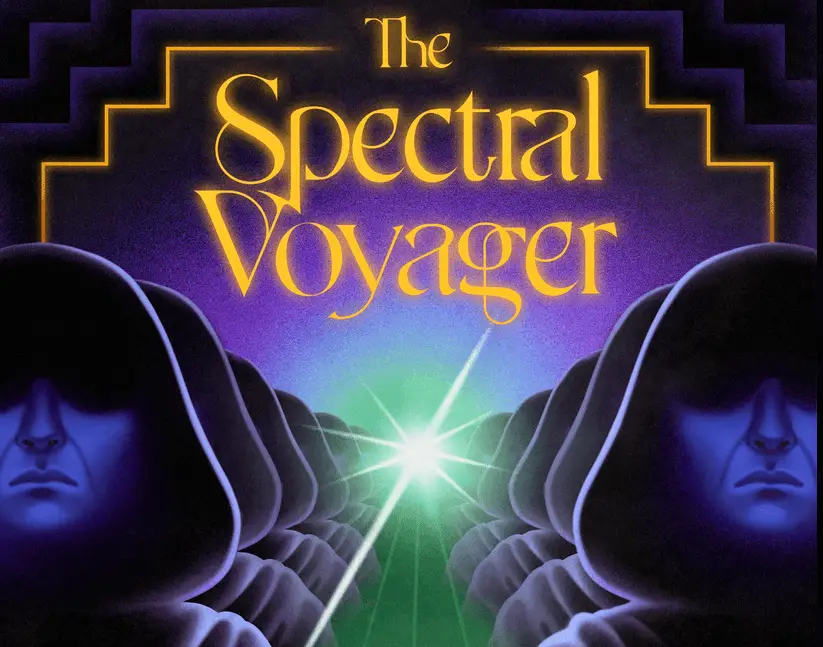Over the past few years, we’ve seen an alarming rise in the proliferation of dangerous conspiracy theories and extremist views. But there was a time when those wacky topics were less political and much more, well, fun.
Spectral Voyager, a side project of the popular QAnon Anonymous [QAA] podcast, aims to reclaim this sense of whimsy, without the potentially bad side effects. Hosted by regular QAA host Jake Rockatansky and Brad Abrahams, director of the documentary Love and Saucers, the show takes us back to the days of spooky, late night call-in radio shows.
“The inspiration for the podcast for both of us was Coast to Coast AM; the classic Art Bell era, pre-George Noory,” says Abrahams. (Noory took over for Bell after his death in 2018, and the current talking points of Coast to Coast AM are, at best, extreme right wing politics, and at its worst, QAnon-adjacent.) Spectral Voyager is “trying to capture that feeling, where Art never really tipped his hand about what he believed, who he believed, but he was just always open to hearing whatever stories, no matter how crazy it was,” says Abrahams.
“Over those decades almost every paranormal, strange, esoteric story that’s made its way into the public consciousness, sort of, was birthed there — like Mad Mike and Mel’s Hole, and various UFO sightings and stories,” says Abrahams. Besides the story of Mike Marcum, who thought he invented time travel, other Spectral Voyager episodes include ones dedicated to poltergeists and the alleged flying saucer landing in Socorro, New Mexico, in 1964.
https://twitter.com/i/status/1684988322551320576
“The title we originally wanted (but was taken) was We Want to Believe, because on [QAA], we don’t want to believe any of that stuff, and it’s pretty much debunking and cultural commentary on it,” says Abrahams. “But for this, for each episode, we wanted a little bit of a question; ‘Could this be real?’ We kind of wanted it to be real, too.”
“A lot of these things feel real to me, but I’m gonna hold space where there could be a rational explanation, and that’s something that inherently comes with doing the QAA podcast,” says Rockatansky. “I think it’s important to include ways in which these things can be rationally explained; try to imagine what the rationale could be, even if we don’t settle on something.”
“When we announced [Spectral Voyager], there was some very understandable concern,” says Rockatansky. “We couldn’t make something that was in direct contrast to this other show that has devoted years and years and years to really trying to find what are the facts and what’s real… I think we really found a nice middle ground between using primary source material and not discounting people’s experiences or stories, but also asking the right questions of, ‘What do experts say about this?’ or, ‘What does science say about this?’ or, ‘What are some criticisms to these beliefs or ideas?’”
“We were definitely enamored by the sort of relaxing sense of wonderment that you get from those old Coast to Coast AM shows and just AM radio in general,” says Rockatansky. “I was really interested in trying to create something that was sort of exploratory but that also had a real sense of narrative too… I was chasing a feeling, and the feeling was before doing the QAA podcast, [which] ruined all conspiracy theories for me,” says Rockatansky, with a laugh.

“That’s what separates us from what could be considered irresponsibly only telling one side… we try to bring some of the rigor that we have on the regular [QAA] episodes, but not in a Richard Dawkins, militant kind of skeptical approach,” says Abrahams. “Being a spin-off of the QAA pod, I think that we had a responsibility to the audience to make sure that we didn’t spin off into uncharted waters in terms of beliefs and insisting, ‘It looks real to me!’”
From the John Carpenter-style theme music (by QAA composer Nick Sena) to the old-school style radio play sound effects, Spectral Voyager gives you a chance to reclaim that sense of wonder and awe which, as Abrahams says, “kinda gets beaten out of you over time as the magic of the world falls away.”
The first episode of Spectral Voyager is available for free on most podcast platforms. The rest can be accessed through the QAnon Anonymous Patreon. Spectral Voyager is available for all subscribers, as Bell would say, whether you are located west or east of the Rockies.
Join the AIPT Patreon
Want to take our relationship to the next level? Become a patron today to gain access to exclusive perks, such as:
- ❌ Remove all ads on the website
- 💬 Join our Discord community, where we chat about the latest news and releases from everything we cover on AIPT
- 📗 Access to our monthly book club
- 📦 Get a physical trade paperback shipped to you every month
- 💥 And more!













You must be logged in to post a comment.